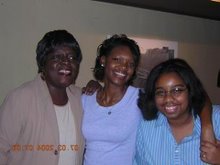My personal fulfillment of one thing – Hip-Hop – was secret and peddled as the fulfillment of a higher cause.
I shielded my radio-bumping music and my self-proclaimed activist mentality from those close to me. My middle-class background didn’t allow me to see beyond the sentiments echoed by old-schooled blacks and whites. To them, Hip-Hop seems to be a blemish on culturally American music. I disguised my admiration of Hip-Hop for a conservative image.
Now that the strange English, sagging pants, and bling bling associated with today’s gansta rap have become social codes, I might as well confess. I love Hip-Hop -- not the “Real Slim Shaddy Please Stand Up” Eminem-type rap; instead, I prefer the lyrical genius “Power to the People” genre.
Hip-Hop Confessions
I haven’t always been fond of Hip-Hop.
I’m not a product of the Bronx, where Hip-Hop was founded. I didn’t grow up standing on house stoops listening to poetic artists dressed in sweltering leather suits and three-striped Adidas without shoe strings. I don’t have memories of up and coming rappers be-bopping and scatting to undocumented beats and words.
Run DMC, the Cold Crush Brothers, and the Sugar Hill Gang, all Hip-Hop trailblazers, I knew. I’d seen images of record spinning DJing, emceeing, break dancing, and loud graffiti colors spray painted on old brick buildings. I’ll never forget LL Cool J’s urban style of thick gold chains with cotton and leather Kangol hats covering his eyes.
Social despair caused urban rappers to create Hip-Hop, and me to relish it. I bought my first Hip-Hop CD for the same reasons the Hip-Hop culture clings to its artist. I’d fallen in love with Kanye West, Mos Def, and Talib Kweli. I could dig a Tribe Called Qwest and The Roots. The words of West, Common, and the Lost Poets helped me to grasp an understanding of the same street corners my father, uncles, aunts, and cousins turned to for comfort. The song’s words still resonate in my mind:
The corner, where struggle and greed fight…we write songs about wrong cuz its hard to see right…look to the sky, hoping it will bleed light…reality’s a bitch, and I heard that she bites the corner (Common, “The Corner,” 2005).
Listening to West’s Jesus Walks (With Me), I understood why ex-sinners were mystified and shouting to a higher being. As the late James Baldwin wrote, “their pain and their joy were mine, and mine were theirs.”
Love Is…Hip-Hop
Joy, pain, and love are what resonate when I listen to Hip-Hop artist, Common, short for Common Sense. College classmates introduced me to the Chicago native. Common’s charismatic style complements his physique. He is a caramel-colored brother with the style of a local businessman and the mind of a social activist. On the back of his latest CD cover, the artist sits content dressed in a business shirt covered with an orange sweater. He sports a smooth beard, and a Kangol hat covers the complexion of his beautiful eyes. Behind him, is a black and white picture of Malcolm X, the one where he’s posing with his index finger pressed against his face. The former emcee has a sensual melody that is inviting. He is without gangstaness and yields to an obsession of material things. I respect him for his feminist words:
I was rolling around, in my mind it occurred
What if God was a her?
Would I treat her the same?
Would I still be runnin’ game on her?
In what type of ways would I want her?
Would I want her for her mind?
Or, her heavnly body (Common, “Faithful,” 2005).
I credit Hip-Hop for its role in re-establishing love into a community that once said, “Black is Beautiful.” Who would’ve ever thought young souls would once again walk the streets of Harlem with dignity? The ingenuity of soul lives through Hip-Hop. It permeates streets known as South Cottage Grove and Lenox Avenues. For the same reasons Negroes admired a tall man with black trimmed glasses who walked the streets of Harlem as a celebrity, Hip-Hop has become the urban anthem for self-preservation.
I don’t remember the exact moment I discovered Hip-Hop, but I embrace its clasping melodies when I listen. Lyrics of truth telling embedded with unfamiliar beats soothe me when I need a fix of consciousness. Hip-Hop lives, and young minds continue to grasp it for the same reasons I did discreetly – it gives a voice to the voiceless.
Salaam,
E. Tanille
Monday, April 16, 2007
Subscribe to:
Post Comments (Atom)

No comments:
Post a Comment